Women and Wine: Annette Boyd
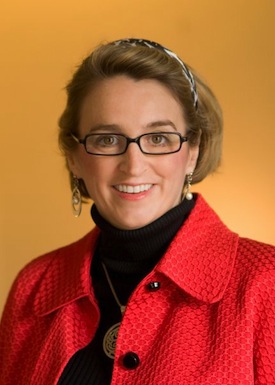 The Virginia wine industry has taken off in leaps and bounds due to better winemaking—no one disputes this claim. However, another reason why Virginia wines are finally on the international radar has to do with effective marketing. In the past several years, the Virginia Wine Board Marketing Office has taken on the challenges of presenting Virginia wines to international markets including the royals of England; more recently, it planned the successful 2011 Wine Bloggers Conference held in Charlottesville. The mastermind behind these operations is Annette Boyd, director of the Virginia Wine Board Marketing Office. Annette deserves as much notice as any winemaker in Virginia for catapulting the industry to the heights that it enjoys today. Without further fanfare, meet this month’s Women and Wine feature, Annette Boyd.
The Virginia wine industry has taken off in leaps and bounds due to better winemaking—no one disputes this claim. However, another reason why Virginia wines are finally on the international radar has to do with effective marketing. In the past several years, the Virginia Wine Board Marketing Office has taken on the challenges of presenting Virginia wines to international markets including the royals of England; more recently, it planned the successful 2011 Wine Bloggers Conference held in Charlottesville. The mastermind behind these operations is Annette Boyd, director of the Virginia Wine Board Marketing Office. Annette deserves as much notice as any winemaker in Virginia for catapulting the industry to the heights that it enjoys today. Without further fanfare, meet this month’s Women and Wine feature, Annette Boyd.
1. How did you get involved in the Virginia wine industry?
I worked in a wine shop when I was in college. Strawberry Street Vineyard in the Fan in Richmond. I caught the wine bug there and was hooked. I started working there when the 1982 Bordeaux were released and Robert Parker was some attorney who had started a wine newsletter. Two years out of college, I was working for a non-profit events organization doing their marketing and the wine shop owner called me and said “I saw an ad for a job you need to apply for.” It was promoting Virginia wines for the Virginia Department of Agriculture. I applied for the job and worked in that position for 5 years promoting Virginia wines for VDACS. It was like the wild west then, but very fun. It was under my tenure that we created October Virginia Wine Month, moved the Governor’s Cup Competition unveiling to a reception separate from the then Vintage Virginia Wine Festival and started a program to get retailers and restaurants to promote and serve Virginia wines.
2. What do you enjoy most about directing the Virginia wine board’s marketing office?
First, I love Virginia wine and I love marketing. Anyone who gets to work where they have a passion is very lucky. I include myself in that category. Also, I’ve worked in several marketing and advertising jobs over the years and it’s rare that you get to see the direct results from your work. We get to see that every day. It’s a great feeling to see an article or ad or a Virginia wine event that may have turned out differently if we had not helped guide the process. Virginia wines have a great story and a great product. We just help get the story out there.
3.The majority of wine consumers are women, and your job requires you to interact with wine consumers as well as wine industry experts. Do you see any shift in the consumer base toward men? Do you have particular strategies that target women? Men?
I have seen the national statistics on wine consumption and how men are gaining momentum in wine consumption particularly with red wines. While the Virginia Wine Board budget has increased over the past couple of years, we still do not have a budget large enough to run targeted concurrent campaigns that reach one gender or another. In addition, I believe that smart targeted campaigns that speak to passionate wine drinkers can target both genders effectively so separate messages have not been necessary. Passion for wine does not necessarily divide along gender lines. Shoes, though are entirely separate category.
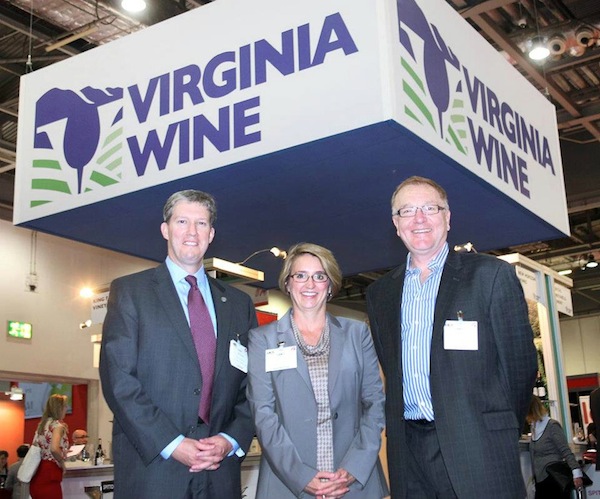
4. Do you think women have a better palate for wine than men?
I have read the studies that say women have an edge, but I don’t really see it in my anecdotal evidence. I think focus is a much better indicator of accuracy with your palate, though when I was pregnant I could smell vivid details of wine at 10 paces. It was uncanny. I tend to prefer drier wines and really do not appreciate sweeter wines. Also I prefer reds. My husband prefers white wines so that reminds me every day not to weigh too heavily on research. Some days my husband’s palate is exceptional and other days I think I’m more in tune to what we’re tasting. Focus seems to be a more reliable indicator of accuracy for me.
5. Do you have advice for women who wish to get involved in the wine industry?
Yes. First, experience is key. Work at a restaurant or wine shop or be prepared to volunteer at tastings or festivals or other things to expose yourself to working on the frontlines of wine sales. You learn a lot by hearing firsthand what a variety people think about wines and seeing the evaluation process they go through in deciding what they like and on which wines they will choose to spend money. Taste a wide variety of wines, It’s invaluable experience. Also, network like crazy. Wine is a relationship based business. Each contact may lead you to a job or career that’s right for you.
6. What do you like to do in your spare time?
I have an 8 year old son and a husband who travels quite a bit for business so we don’t have too much spare time. Ideally, I love to have dinner with friends when we can leisurely cook and share a bottle of wine. I’m also a music and history buff and love to read biographies of interesting people. I just finished “Just Kids” by Patti Smith. And prior to that, I read “Jacqueline Kennedy: Historic Conversations on Life with John F. Kennedy,” Both books illustrate very different amazing women.
Photos were borrowed from her Facebook page.
Women and Wine: Kirsty Harmon
The Women and Wine series continues, and this month we feature the winemaker from Blenheim Vineyards, Kirsty Harmon. We also got a chance to meet up with Kirsty at Taste Camp that was held in Loudoun County this past weekend and to sample some of her wines at the event. (Be sure to check in later in the week for a write up of the Taste Camp events.)
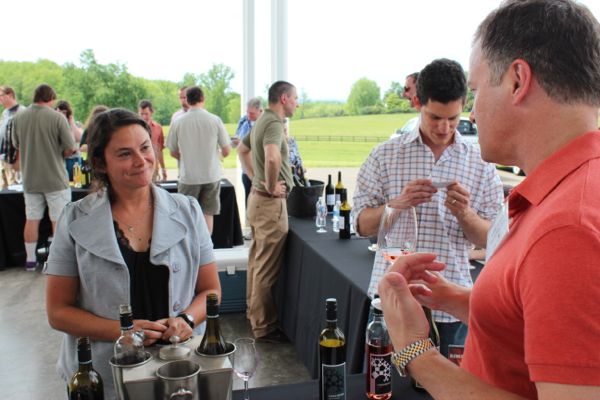
1. Why/how did you get into winemaking?
I got into winemaking by accident. My background is yeast genetics and I worked in a Microbiology Lab at the University of Virginia for several years. I left the lab to pursue a career in event planning, but ended up working in a winery after planning just a few events. I met Gabriele Rausse soon after starting to work in the winery and it was Gabriele who told me that I could and should become a winemaker.
2. Do you think that women have more developed palates than men? If so, explain why you think that this is the case.
I don’t necessarily think that women have more developed palates. Perhaps we have a better memory than men, which might make us better at remembering what we’ve tasted before and how that compares to what we are tasting now.
3. Is there a comradery amongst female winemakers in Virginia? Is this apart from or in addition to working relationships with males in the field?
I think that there is a good winemaking community in Virginia amongst most winemakers. To be honest, I don’t really think about the fact that most winemakers in Virginia are men. There are plenty of women in other areas of the winemaking business, so in my day to day dealings with the wine community, I interact with a great deal of women.
4. How would you describe your own particular style of winemaking, and how might it be different from other winemaking?
I’d like to think that I make approachable, fruit forward wines. I try to make wine that is ready to drink in its youth and perhaps this is a slightly different approach than some other winemakers in the area.
5. Do you have any advice for women who might be contemplating a career in making wine?
I’d tell anyone interested in a career in winemaking to try to get into a winery or vineyard and do some work! There is no better way to understand what is involved in winemaking than to volunteer at harvest or help with bottling, or even work in a tasting room. The more you are around wine, the more you can see if you are really interested in the whole process.
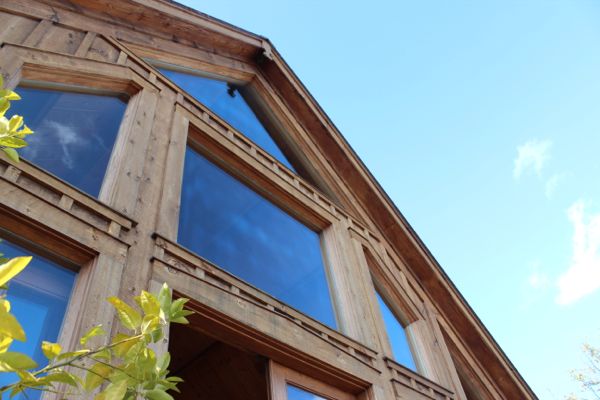
Women and Wine: Emily Pelton
We continue with our Women and Wine series with a spotlight on Emily Pelton. Emily and her father, Andrew Hodson, are winemakers at Veritas Vineyards and Winery. Veritas Vineyards and Winery opened in the summer of 2002. Visitors are always impressed with the estate’s lovely grounds and facilities; however, it is the wines that impress judges and critics. In fact, the Veritas 2010 Vintner’s Reserve Meritage Blend won a gold medal at the 2012 Virginia Governor’s Cup. Read on to find out more about the woman who creates these award-winning wines.
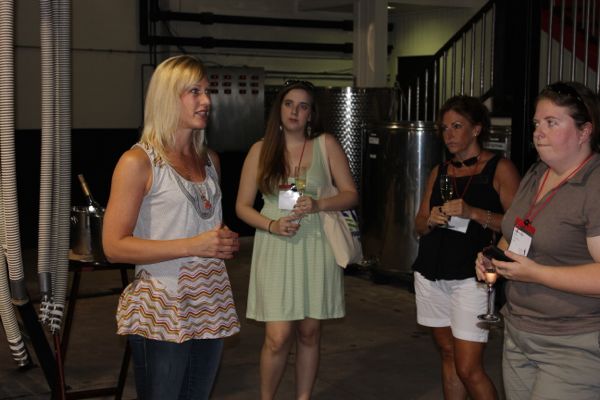
1. How did you get into winemaking?
My parents decided to move to Virginia and plant a vineyard and open a winery. When I heard that they were doing this, I really wanted to be involved. I thought that I might work with them for a year or two, but I never looked back after I moved here from Atlanta. I loved the industry, loved the people, loved the science, loved the art, I fell in love with winemaking. After a couple of years planting the vineyards at Veritas I enrolled in the Food Science Program at Virginia Tech and worked alongside Dr. Bruce Zoecklein to get my Masters in Fermentation Science.
2. In your opinion, do women have better palates than men? If yes, please explain.
Better? I don’t know that I would qualify it as better, as much as different. Obviously the media plays up that we are more discerning, or have higher sensitivities, but I have never thought that my palate is better than anyone else’s.
3. How would you describe your own style of winemaking? Do you think that it is different than that of a male winemaker?
My winemaking style has certainly changed over the years as I have learned the specifics of my vineyards and certainly in regards to vintage differences. My own style of winemaking is with a focus to restraint and elegance. As corny as it sounds, I really like to let the combination of grape and microclimate show through in my wines, and year after year as I harvest the same grapes from the same blocks, I am learning the quiet details that are specific to each block of vine/rootstock/soil/microclimate. I have very different techniques in my winemaking than a lot of my male counterparts, but I learn from them on a daily basis of why they do what they do and how it works for them.
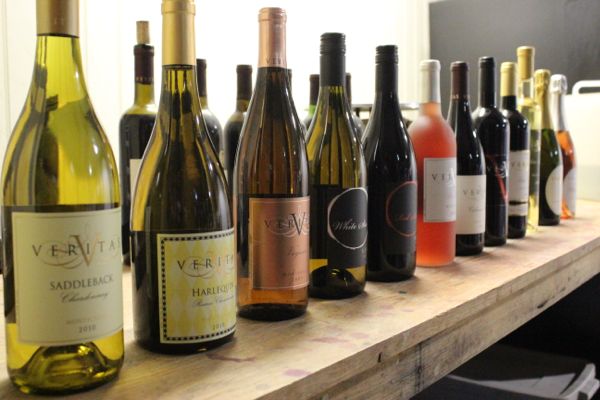
4. Is there a special comradery amongst female Virginia’s winemakers?
In all honesty, there are not very many of us and we are spread out all over the state, so we haven’t had much opportunity to build a special comradery. I do however feel like there is a special comradery amongst winemakers in Virginia. I have a very high regard for my fellow winemakers, and enjoy calling them colleagues and friends.
5. Who were your female role models, and what advice do you have for women who are considering a career in winemaking?
Annie Favia, a viticulturalist out in California who I have never met but have been following for years. I love her philosophy about patience with wine and her quest to achieve natural balanced and unique expression of fruit. She taught me to accept the fact that Mother Nature reigns supreme and she states in her bio that ‘trying to fight it is futile, improving on it is an exciting and fun challenge!’ When I read this in her bio I was inspired to continue on my plight in the vineyard and the cellar searching for the details that make Veritas wines distinctive and expressive as wines from a certain place, not just wine. She inspired me to stay on this path. My advice for women who are considering a career in winemaking is to get the education and then just go do it.
6. What do you enjoy doing in your spare time?
I have two daughters (3 and 6), so in may spare time I like to fill all my space with walks and kid projects with my girls. I also love orchids and have an extensive orchid collection.
Women and Wine: Jen Breaux Blosser
Jen Breaux Blosser is General Manager of Sales, Marketing and Hospitality at Breaux Vineyards. She is also a very familiar face to Virginia wine lovers. Jen is a visible face in the tasting room at Breaux Vineyards, and she constantly interacts with wine lovers on Facebook and Twitter. Her energy and passion for Virginia wine is limitless. When Jen is not at the helm of a winery that has earned numerous national and international awards, she is also a mom to three boys. Read on to find out more about her.
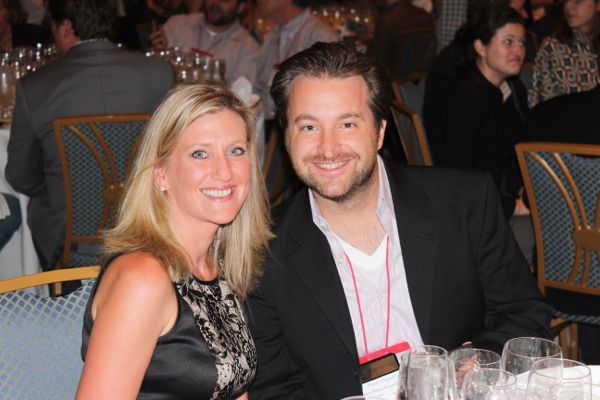
1. How did you become involved in the wine industry?
My father purchased the land that is now Breaux Vineyards in 1994 with no intentions of starting a vineyard. The goal was to make this a retreat from the day to day of our family real estate company on the Outer Banks, Sun Realty. We were home to a little log cabin, horses, cattle, soy beans and other agricultural products. My father went out to clear a field one day that was overgrown and before he made the first pass with the tractor, and he noticed what he thought were intentionally planted grapevines. Once he discovered that his assumption was correct, he used his green thumb and training from the Norfolk Botanical Gardens to re-cultivate those vines and made some solid “garage” wines to share with family and friends. Wine was always something that we enjoyed at family gatherings and social settings and he had grown increasingly interested in collecting and enjoying wine as a hobby well before he found the vines. Being the entrepreneur that he is, he researched the industry in VA and afar and after many promptings from family and friends, he decided to begin what is now Breaux Vineyards. Passions fueled, he hit the ground running. I was excited as I was just gaining an interest in wine to add to my already burgeoning interest in food. I had had my share of boxed wine but ultimately, I was the girl in college who ate Ramen noodles, but drank Caymus Cabernet and Conundrum. I had my priorities! I made it a point be-friend the owner of the local wine shop as well. She really took me under her wing and walked me through many new wines, educating my palate and encouraging me to build my wine vocabulary.
Food and wine were my passion and I began working in restaurants when I had time and I continued to do so even after I had a husband and children just to feed that passion. From waiting tables to bar tending, wine steward to sous chef, I worked my way through the ranks of the industry. I moved back to the Outer Banks after college and obtained a license that permitted me to assist in promoting Breaux wine via wholesale there and conducted wine tastings and promotions in restaurants on the Outer Banks. I also assisted at special events at Breaux Vineyards and helped plan the festivals during that time. This was 10 years ago! One fateful day, my father called and asked if I would be interested in relocating and joining the family business on a deeper level. The timing was great and with little hesitation, my husband and I agreed to make the move. We joined in 2005 as the 2nd generation to run the winery and vineyard and have been fully immersed in the VA wine industry and the family business ever since.
2. According to a recent New York Times article, women account for at least 64% of wine consumers in this country. Do you find that most of your customers at Breaux Vineyards are in fact women?
We do see more women in the Tasting Room than men and we find that they are most often accompanied by other women. When a male and female come in together, the female typically makes the bulk of the buying decisions. We see more groups of females at our offsite events as well. From “Girlfriends Getaways” to “Red Hat Clubbers”, I can say without hesitation that most of our customers on a daily basis are women.
If so, does this influence your marketing strategy?
Historically speaking we have marketed to broad audience without much consideration to gender. With data proving that women are the largest wine consumers, we certainly have modified our strategy and have begun to target females with some of our marketing efforts. We have some very exciting female-centric marketing efforts planned for 2012, primarily with events. It’s interesting to look at the statistics – 72% of our Facebook fans are women! I have no plans to create a wine that will be marketed just towards women (yet) but I certainly am paying attention to my audience. Don’t worry guys, we have some great things in store for you too!
Have men responded to current upward trends in wine consumption?
I do believe that more men are consuming wine, especially since beverages, in general, are so trendy. From spirits and microbrews to fine wine, men are paying attention to what they drink. Young professionals especially seem to have a deeper interest in learning about the wine industry and how to pair wine with food, order wine and how to properly analyze wine. For the current generation of young adults, wine is viewed as being more of a luxury beverage and the beverage for special occasions whereas beer is viewed as an every-day beverage. This is, however, slowly changing as wine knowledge increases. With that, rises consumption. I can say that over the past 7 years I have seen fewer men visiting the Tasting Room who ask if we sell beer onsite. Today, I see men happily sipping wine and making decisions on what they want to drink based on their tasting experience. No matter what their level of experience, I believe that men are certainly drinking wine and sharing their passion with friends. The days of wine being only for women are over. Statistics still tell us that men drink beer and liquor more frequently than wine…I guess those men just need to drink some Virginia wine to change their minds on which beverage to reach for!
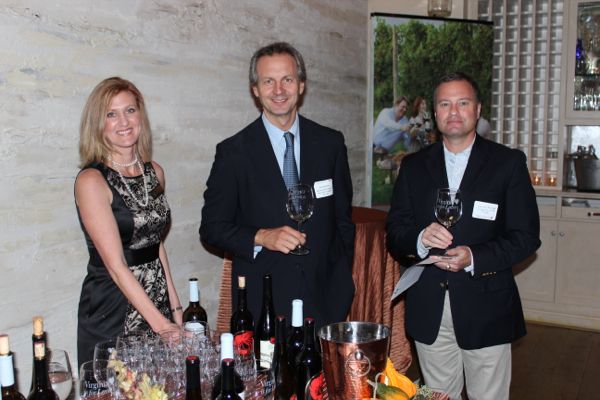
3. Do you think women have a better palate for wine than men?
Wow…that’s a loaded question. Can I answer it truthfully without getting into trouble? There are more female ‘Super-Tasters” in the world than male so even though I believe that with training we all have the ability to taste and discern wine with accuracy, I do believe that women who are Tasters or Super Tasters are equipped with a more discerning palate. I have noticed that women have a larger capacity for citing elusive aromas and flavors and they have seem to have a more richly developed “wine vocabulary.” From what I have experienced in the Tasting Room, women are often more open to discuss what they are tasting in the wine and aren’t afraid to hold back if they have a question about the aromas or flavors. Men are sometimes a bit more reserved. I believe that both men and women can be trained to properly analyze the aromas and flavor profiles of wine but if I have to choose, I’m going with girl power! Women, even though we’re working as much as men, still usually take care of most of the domestic duties at home, cooking included, which could help in flavor and aroma recognition as well as the vocabulary associated with each.
4. You have definitely realized social media’s potential to promote Virginia wine and in particular, Breaux Vineyards. Has use of social media produced desired results?
Absolutely! We reach thousands (over 4,500) of people via Facebook daily and over 2000 via Twitter daily. Email marketing and our social media efforts provide us with the ability to reach a very direct and engaged audience of listeners. We recently won a Facebook competition deeming us the “Best Winery in the Blue Ridge” and for the 4th year in a row, we won the #1 spot as the “Favorite Winery in Va”! We could not have done this without the use of social media. The relationships we create via social media provide us with so much more than just wine sales. We have reached people around the globe and fostered relationships that have created sales for us and also introduced VA wine to a segment of the population that would have never known us without Social Media. I believe that SM helps to create brand loyalty and also brand recognition and it’s here to stay. Other than my time, it’s essentially a free tool to utilize and from a consumer’s standpoint, a fun and organic way to get information about your favorite products.
Which social media outlets do you find to be the most productive use of your time and marketing?
First and foremost would be the use of email via Constant Contact. I can fully book any limited seating event by just reaching out to our e-list. I have a higher than average open rate and if I had to choose 1 way to communicate via Social Media, I’m going with email. Next to that, I am a huge fan of Facebook because it’s a great way to get information and pictures out to people without being terribly invasive. I find that people follow me on Facebook and jump right in to interacting with me and I can see immediate results. Again, it’s fun for me, fun for the follower, and is a fabulous conduit for info and marketing. Twitter takes a close 2nd but the limited amount of time I have these days I prefer to only use Twitter when I have time to actively engage.
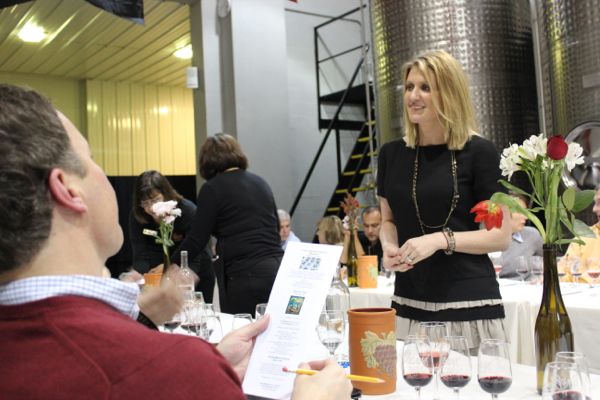
5. What are your biggest challenges as General Manager of Sales, Marketing and Hospitality at Breaux Vineyards?
On a personal level, juggling the demands of the family business 7 days a week while trying to be an engaged wife and mother to my 3 children are my biggest challenges. Anyone who has a vineyard and winery can attest to the fact that it is a labor of love and I’m not alone in my personal challenge. It’s very important to me that I set a positive example of living a balanced life so that my family and business do not end up suffering. It’s a work in progress and very hard to accomplish when your passion is also your career.
On a strictly professional level, my biggest challenge is staying on top of this ever-changing industry. We are presented with opportunities every day and it’s not possible to seize every one of them. I work hard to keep things going on a general level at the winery while pushing Breaux Vineyards forward with new opportunities and endeavors. We have been growing as a business in some capacity since our start as the 50th winery in Virginia in 1997. I call it “controlled chaos”. Thankfully, I’m very type-A and thrive in a fast-paced environment, as well as having an amazing team at Breaux who work hard to keep us moving forward.
6. What challenges do you think still remain for women who wish to pursue a career in the wine industry?
In the last 20 years, the face of the industry has changed dramatically– women are now playing important roles in all aspects of wine. The only place in the industry where I still see a trace of that historical male dominance is in winemaking itself. Since most winemakers are still men, female winemakers sometimes do run the risk of being seen as more of a novelty than being taken seriously as a winemaker. Fortunately, even that is beginning to change.
The other place that I still see a challenge is in achieving the always elusive work/life balance. The wine industry is extremely demanding and should be viewed as a lifestyle instead of simply a career by anyone who wants to become involved. Statistically speaking, women tend to be the household managers, so the biggest challenge for many women lies in seeking that balance while juggling an extremely time-intensive career such as winery ownership, winemaking or management.
Women and Wine: Lori Corcoran
Winemaker and Mom
Lori Corcoran is featured in this month’s Women and Wine segment. Lori is the winemaker at Corcoran Vineyards, an award winning winery in Loudoun County. Lori and her husband, Jim, started the vineyard in 2001. Lori is not only a full time winemaker at Corcoran vineyards but also a full time Mom!
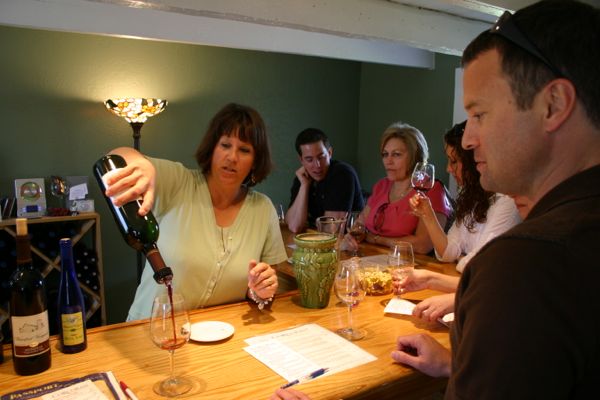
1. Why/how did you get into winemaking?
I became a winemaker because after working in our vineyard for a few years, I realized that wine is made in the vineyard and wanted to enjoy the fruits of my labor.
2. Do you think that women have more developed palates than men? If so, explain why you think that this is the case.
Women winemakers make up about 10% of the winemakers in North America and I feel that we have some advantages over our male counterparts. We tend to have a better sense of smell and I think this helps, but most important whether female or male, the greatest ability for a winemaker is to know what world-class wines really taste like, so you have a benchmark to work from.
3. Is there a comradery amongst female winemakers in Virginia? Is this apart from or in addition to working relationships with males in the field?
I would say there is a good comeradery among female winemakers here in Virginia, but would also say the relationship between male winemakers is just as good. Virginia I feel is much different than most other wine regions. We all work well together for the same goal of showing the world; Virginia is serious about making world-class wines.
4. How would you describe your own particular style of winemaking, and how might it be different from other winemaking?
My style of winemaking is to be consistent. I hear about new world style and old world style all the time and the real difference today is our knowledge and understanding of winemaking. Although Mother Nature changes things up every harvest, I am very consistent in my practices in the winery and make the changes I need to ensure the best wine being produced from each harvest. I am almost a purist at heart when it comes to variety of grapes and each retaining their true character. Thus most of our serious wines are 100% of that variety such as our Cab Franc or our Viognier. I do blend when I make a Meritage but really like the expressions of the fruit we get here in Virginia and want that to be conveyed in each bottle.
5. Do you have any advice for women who might be contemplating a career in making wine?
Advice for those women looking to become winemakers is to make sure they have the passion required to be a winemaker, this is true whether female or male, you need to have such a deep passion for what you do, that it never becomes a job only a life-style. I think this is what separates all winemakers.
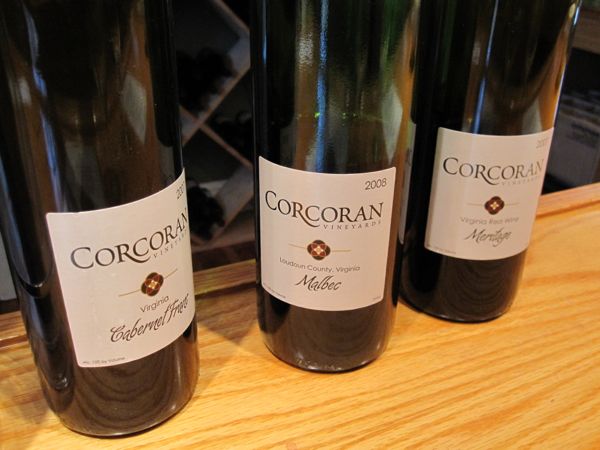
Women And Wine: Diane Flynt
Serious About Cider
This month we begin our first installment of a new feature called Women and Wine. It is no secret that men dominate the wine industry; however, women are becoming an increasing industry presence and serve as winemakers, winery owners, vineyards managers, and business specialists. During our summer travels through the southern portion of the state, we tasted the lovely ciders produced at Foggy Ridge Cider, and we are big fans of the crisp Serious Cider. We had previously met cider maker and owner Diane Flynt at a cider tasting this past spring, and we wanted to know more about Diane and her passion for cider making. Therefore, Diane Flynt will receive the spotlight in this inaugural post. Enjoy!
 1. Why/how did you get into cidermaking? Cidermaking, like winemaking, is a challenging craft now dominated by men. Do you think that there are any special challenges for women pursuing this field?
1. Why/how did you get into cidermaking? Cidermaking, like winemaking, is a challenging craft now dominated by men. Do you think that there are any special challenges for women pursuing this field?
Just as great wine begins in the vineyard, I believe that truly wonderful cider begins with fruit. I came to cidermaking through farming, and think of myself first as a farmer or orchardist and, second, as a cidermaker. My grandfather was a farmer and my engineer dad was also closely connected to the land. My Mom was a plantsperson as well, who grew prize violets and was a professional with the Girl Scouts. I’ve always been a keen observer and student of the natural world—a key ingredient in growing anything. I often joke with old time apple growers that I “treat my trees as individuals”. And I do, as good quality fruit, full of complex flavor and properly harvested is the foundation of excellent cider.
There are several women cidermakers in the US—Susan Knapp of Slyboro Cider is a good friend and I’ll work with Autumn Stoscheck of Eve’s Cider this fall at Cider Week in New York. I’m not sure the challenges women face in the cider world are any different from gender challenges in any other working environment. I’ve had to gain the respect of the farming old timers in SW Virginia just as years ago in my corporate career I worked to gain acceptance and respect from my male colleagues in banking. Anytime there is a “first” or “only”, as in “first woman Region Executive” or “only woman cidermaker” there are issues of acceptance and respect. Research shows that as the percentage of any minority grows in a workplace, issues of acceptance and respect decline so perhaps this is happening in the wine and cider worlds.
2. Do you think that women have more developed palates than men? If so, explain why you think that this is the case.
I’ve read that women are able to distinguish some flavors and aromas more easily than men, but I can’t quote the science behind this. Of course we know that a palate is both genetically driven, as in number of flavor receptors and other genetic markers, and developed. I work hard to develop my own palate through structured tastings, education and regularly tasting—and drinking which of course is different—all kinds of wines and ciders. If I only drank Foggy Ridge Cider and my favorite Sauv Blanc I’d have a poor reference for making cider. Also I think it is critical to involve several trained palates in blending your winery’s wine or cider. Jocelyn Kuzelka, another talented female winemaker, is a consultant for Foggy Ridge. Jocelyn has a great palate; she was trained in Australia and New Zealand and travels widely in Europe (she is from the Czech Republic) so her taste experience is broad.
3. Is there a comradery amongst female cidermakers/winemakers? Is this apart from or in addition to working relationships with males in the field?
I work in a very remote part of Virginia—our county has one traffic light and fewer than 11,000 people. So I grow fruit and make cider in a very isolated environment and have to work to create and sustain connections with other wine and cidermakers. This is one of the few things I dislike about living in my special corner of the world. Foggy Ridge Cider is distributed throughout Virginia and also in NC, SC, AL and now New York, so I travel frequently and always seek out wine or cidermakers in these markets. My distributors in SC and New York are generous in including Foggy Ridge in portfolio tastings, so I have the opportunity to meet winemakers from CA, WA and, recently, champagne makers from France in a grower champagne tasting at Grass Roots Wines in Alabama. I always seek to learn more, from male or female colleagues, and am more often than not, pleased with others’ willingness to talk about their wines or ciders, growing practices and winemaking approaches.
4. How would you describe your own particular style of cidermaking, and how might it be different from other cidermakers?
“Clean” is a term often used to describe our cider. I don’t like the funky off-odor style of some French and many Basque ciders, which seem distinctly flawed to my palate. I work hard to create ciders that show varietal characteristics, and I especially like the Hewe’s Crabapple and Harrison which come through beautifully in our First Fruit Cider. I like intensity in cider, which can often be somewhat thin due to lower alcohol and muted acidity. At our elevation we have bright acids, plus I grow lots of Ashmead’s Kernel, a delicious and complex apple that is also an “acid bomb” that I use for blending. Our most fruity cider is Sweet Stayman, still only about 2% R.S., but with full apple flavor balanced with crisp acidity from Ashmead’s Kernel. I prefer to express apple aroma, flavor and complexity and, unlike some of my colleagues who use oak, I ferment everything in temperature controlled stainless. At the New York Portfolio Show last week for T. Edward Wines, our NY distributor, the terms I heard most from Somms, and shop owners were “lovely”, “clean”, “refreshing”, “delicious”. Not very scientific tasting terms, but all things I like to hear from customers!
5. Do you have any advice for women who might be contemplating a career in making cider or wine?
First, master the science of wine or cidermaking—this is an essential building block and one that cannot be ignored. You need to develop these skills yourself through a rigorous training program, or be prepared to supplement your skills with those of a consultant. Second, get practical experience. You will spend much more time cleaning tanks than you will tasting wine or cider, so it’s important to be sure you like the “nuts and bolts” of the role in addition to the romance. And last, find a mentor (or two or three) from whom you can learn. This is very much an apprentice business—I feel my own success rides very much on the shoulders of the many talented wine and cidermakers who’ve helped and advised me over the years.
One final thought is on collegeality—for the most part, I’ve found women wine and cidermakers to be quite open about their experiences and generous in sharing ideas. Of course I’ve met many male wine or cidermakers who are the same, but perhaps feel the gender bond with “women to women” communication creates more openness. I’d value more opportunities to talk to other women wine and cidermakers—perhaps you should consider sponsoring a W2W Wine Conference!
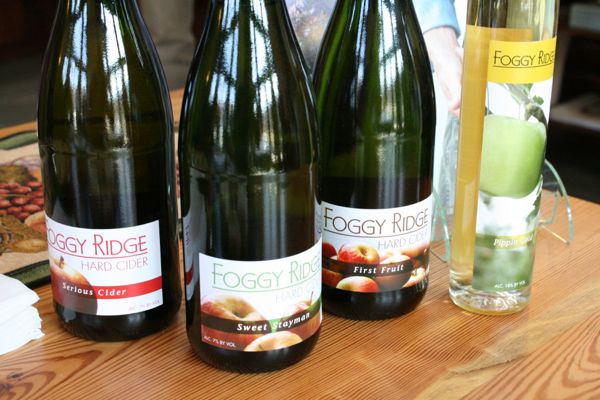
Great post – I will have to visit next month when I am visiting family in Virginia…
Thanks
Cynthia Cosco